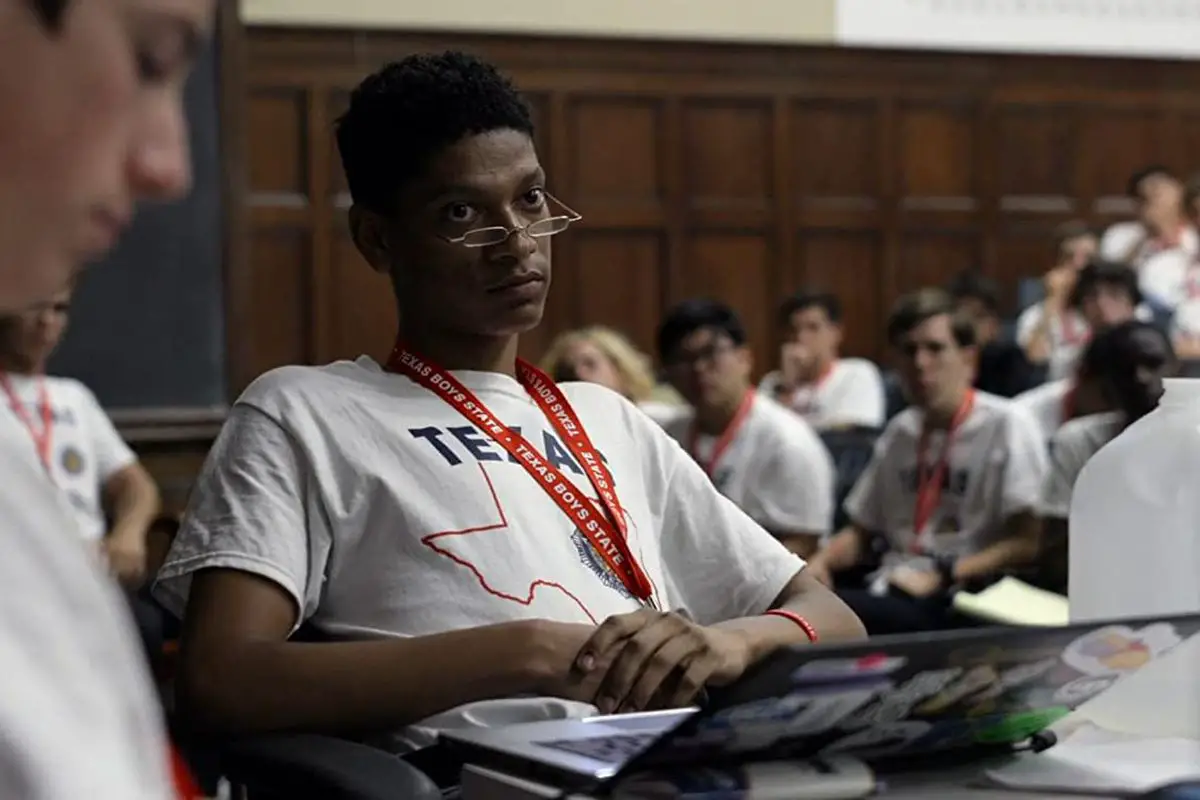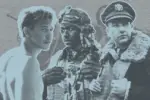“Boys State” documents a 2018 week-long program by the same name in which teens learn about democracy through an experiment in self-governance. Since 1935, the American Legion, a nonprofit war veterans’ organization, has sponsored Boys State, which boasts several notable alumni, including Bill Clinton, Dick Cheney, Cory Booker, Bruce Springsteen and Neil A. Armstrong.
The program runs as follows: Over 1,000 Boys State participants are sorted into two political parties, arbitrarily named the Federalists and the Nationalists, and then must determine their party platforms and elect their leaders, the highest office being governor. By running a mock government and focusing in particular on the processes leading up to an election, these high school juniors gain insights about leadership through a political lens.
The documentary centers its narrative around four boys from different backgrounds, spotlighting their unique perspectives as a way to represent the Boys State experience. Hailing from the Federalist party is Ben Feinstein, a geeky double amputee whose experience living with a disability supports his belief that the country should not focus so much on the limitations of those that are marginalized due to race, gender or disability, but rather invest in their ability to achieve despite conditions they cannot change. The concept of individualism informs Ben’s political opinions, which he is unafraid to voice.
Steven Garza, on the other hand, is disarmingly empathetic and modest for a 17-year-old boy. Though his progressive stances set him apart from some of his peers, he earned respect from each one of them as the week progressed. Joining Steven in the Nationalist Party are Rene Otero, who is new to Texas, and Rob MacDougall, who embodies the state without being (too) overly obnoxious. Rene’s intelligence, assertiveness and level-headedness make him a natural leader, and his wittiness an audience favorite. Rob’s charming, Southern-football-team-captain persona and his ability to rally a crowd quickly win his peers’ admiration.
After the first round of elections, Ben, who becomes the Federalist Party chairman, runs a tight ship. Thanks in part to him, the Federalists are at first more organized and united than the Nationalists, a rowdy group who Rene, also a party chairman, finds difficult to handle. They joke around, throwing out ideas like secession, banning pineapple on pizza and castrating rapists as issues central to their platform. Rene’s no-nonsense response inspires an impeachment joke that is particularly frustrating, as he feels he needs to be a “delegate for Black people” during the Boys State program.
Rob and Steven, however, both run to be the Nationalist Party’s candidate for governor. Initially, Rob seems to be the more popular candidate. In order to win, he echoes the shallow opinions that the Nationalists shout from the audience, while mirroring their boyish, boisterous behavior. But after hearing Steven’s speech, Rob realizes that his friend is much better qualified, eventually becoming a loud supporter of his, along with Rene.
Steven’s most critical move is reconciling the right to bear arms with school safety; he takes into consideration the Texan participants’ largely pro-gun stance while also stressing the importance of bipartisan background checks that could better ensure the safety of schools and public venues. Following the Stoneman Douglas High School shooting, he led a “March For Our Lives” demonstration in Houston, an accomplishment — which he mentions in his speech — that reveals his passion, as well as compassion, to the rest of the boys.
After the runoffs, the faux gubernatorial race is down to Steven and Eddy Proietti Conti, who, according to Rob, thinks he is “God on Earth.” Eddy has little to contribute, save his abs (which he says verbatim are his best asset). He only says what his party wants to hear, yet, they remain loyal. It does not help that Ben picks a fight about Rene’s supposed bias while moderating the candidates’ speeches. The next day, they both learn about deleted racist posts on an “Impeach Rene” Instagram account that Ben had endorsed, which he immediately regrets.
Many student-led interviews, promo posts and memes later, the teens nominate Eddy for governor. This speaks to the power of social media and word of mouth in propagating attack tactics — a perfect example of “Boys State” acting as a microcosm of democratic government. As in certain real-life elections that have occurred, it would be naive to assume that a well-qualified, honest candidate would win over a say-nothing-do-nothing rabble-rouser (no offense intended to Eddy as he exists outside of the movie) whose arrogance might come across as an appealing, reassuring kind of confidence.
Later, in interview clips, the boys reveal some of the things they learned upon the conclusion of the program. Rob, for instance, talks about how his presentation as a “politician” made him instantly likable to his party, and yet did not satisfy their inner need for a serious candidate. Unfortunately, Steve’s earnestness only helped him to a certain extent; he discovers that being knowledgeable can only get a person so far in an election. And because of Eddy, Rob also appreciates, in his words, “why politicians lie” to get ahead. Dishonesty is powerful in both “Boys State” — a mere week-long simulation of a democratic government — and in the Capitol.
The documentary opens with a quote from George Washington: “Political parties are likely to become potent engines by which cunning, ambitious, unprincipled men are enabled to subvert the power of the people and to usurp for themselves the reins of government.” This is something participants learned for themselves during their week at Boys State. On the other hand, by the end of the program, each of the boys have made new friends that they are visibly sad to leave behind. Ultimately, they were all capable of unity and respect — although not so much in a political pressure cooker environment.
















